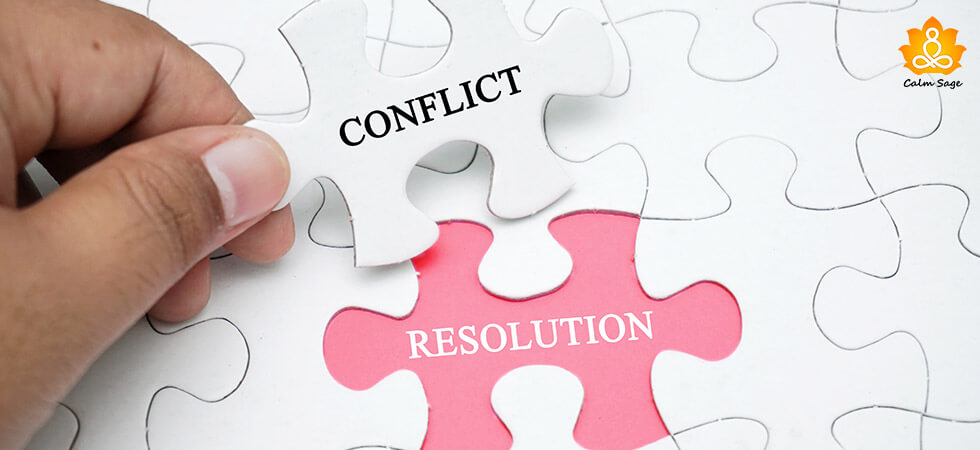Conflict Management and Conflict Resolution – How They Help In Building Relationship

Conflict management and conflict resolution may sound similar, but they are different terms that help resolve relationship issues. Here we explain in detail about them and how they are helpful.
During a disagreement, people usually say let’s settle things via conflict management & resolution. While doing so, they often use both terms synonymously.
But do you know these terms are different and have different objectives resulting in different outcomes? Therefore, before you consider using these terms to settle things, it is best to understand what they are and in what situation they can be used.
This article explains how to use conflict management and resolution to deal with long-term disagreements or make things easier for both parties by managing conflict.
Conflict Management and Conflict Resolution
Conflict management addresses persistent issues in a relationship, while conflict resolution provides a one-time fix for the conflict and closes the topic then and there. They both are types of interpersonal communication important to keep relationships healthy and lively.
But what is conflict? Well, we all know its literal meaning. However, we learn a few more things about conflict and then discuss conflict management and resolution for better understanding.
What is Conflict?
Disagreements between people are often considered conflict. However, a more appropriate definition would be – Conflicts are long-term problems that both parties have been holding on to for a longer time.
At the same time, disputes are short-lived and quickly solved as both parties want to reach an amicable solution. While in conflict, the issues are primarily non-negotiables, and the parties are often either adamant or not ready to resolve the matters.
The dispute often results from conflict or occurs within a more significant conflict. With some interference, these disputes can be solved. However, sometimes even the best fixer and resolution practitioner cannot resolve the conflict. This is when conflict management comes to play.
Also Read: Do You Go To Bed Angry? Here’s Why You Must Avoid It
Conflict Management vs. Conflict Resolution – What is the difference
Conflict management is practical and unaffected by the reason for conflict. Its purpose is to solve the conflict and find common ground where you and your partner can work despite differences. In conflict management, long-term goals are often set so that there can be learning and processing.
Furthermore, it is applied in situations where the conflicts have been there for a long time due to differences in values. Sometimes, the dispute comes to a point where you and your partner may think there is no fix. This is when a conflict manager who knows how to make things work comes to play.
For example, if you and your partner have different food preferences, it creates conflict. A simple conflict management solution will be to compromise and make a plan so that you both can eat your favorite dishes without issues. You can decide to eat Italian on one weekend and Chinese on another. This will not solve the issue of having different food choices but will help manage the disagreement.
Conflict resolution, however, deals with meeting human psychological needs. It is content-centered and focuses on solving the issues to grow the relationship. In conflict resolution, ways to help find a positive outcome are looked forward to. It is about ending conflicts; if help from third parties is required, that is always welcomed.
For example, if you and your partner were about to meet at 5 PM but your partner got late and did not inform you about it. You may get angry and upset. In this situation, talking to your partner and sharing your feelings is best. You can even ask them to see things from your perspective. This way, they can see why you get irritated and may apologize and resolve the conflict by promising to inform you prior and be on time.
| Conflict Management | Conflict Resolution |
|---|---|
| It is a process that goes on for a longer duration and addresses issues that keep occurring and needs management so that peace can be maintained in relationships | Its purpose is to look for a solution that solves the conflict. |
| The aim is to minimize the negative impact of conflict on relationships and keep things going. | The aim is to find mutual ground, fix the conflict, and settle things in the relationship. |
| The focus is on fixing issues that keep coming up. | This applies to problems that can be solved. |
| Keeps the relationship functional. | Provides a workable solution. |
| Manages things. | Works on permanently fixing the conflict. |
| Works on minimizing the negative impact of conflict. | Restores harmony. |
When to use Which Style?
Are you confused about when Conflict Management should be used and when Conflict Resolution should be? Certain situations and factors will help you pick the correct method.
1. Type of conflict:
If the problem you are facing has a history and has been occurring now and then, conflict management is the right approach. However, conflict resolution is the way to go if the issue is short-lived and can be solved by talking or isolating the cause.
2. Emotional depth:
When the disagreement causes emotional outbursts, you can feel tension, frustration, irritation, or emotional distress conflict resolution is the right approach. While if it is an ongoing issue and both partners are like this, it is what will happen. They have already perceived the outcome. Conflict management can help reduce the negativity, ensuring bitterness is not what stays for long in the relationship.
3. Relationship:
If the disagreement has to come to a point where both partners are not ready to talk and don’t want to invest time and energy, conflict management is to be used. While if both are ready to discuss things and work on finding a solution, conflict resolution works best.
Also Read: Understanding The Different Types Of Communication Styles: Which One Is Yours?
In a Relationship, can You ‘Agree to Disagree’?
Sometimes you may wonder that since you and your partner have different values, beliefs, opinions, and perspectives can you agree or disagree? Well, agreeing to disagree is not easy. It involves acknowledging and accepting that you both have different views. Also, it means respecting the partner’s point of view and not forcing them to change their minds.
Once both parties have the mindset of agreeing to disagree, there will be fewer disagreements, meaning there will be no grounds for conflict and resentment.
The key here is to hear out one another, understand another person, and empathize with their point of view, even when it is not that you agree with. However, agreeing to disagree does not always work, but there is no harm in giving it a try.
Even if you can solve tiny issues caused due to differences in personal choices, half the battle is won. This might help to make more significant life decisions with a clear head.
Also Read: 7 Most Common Family Problems And How to Solve Them
Is Agreeing to Disagree Not the Right Thing?
It is the best thing when agreeing to disagree helps you and your partner live peacefully and respectfully. However, if it leads to resentment, lack of communication, or increased conflict as there is no solution and often there are issues as both are walking their way, then it is not the right approach. This is why
before conflict takes over your relationship, you need to take the help of either conflict management or resolution and sort things out.
How Does Conflict Affect Relationships?
Conflicts are both healthy and unhealthy for a relationship.
Generally, conflicts stem from misunderstanding. Resolving a misunderstanding by talking to one another and sharing your feelings is good. But if conflicts are left unresolved, and you keep putting them under the rug, slowly and steadily, it will eat the relationship and make it lose its essence.
Also, when it becomes a part of the relationship, there is no respect for each other, hopelessness is all that can be felt, and there is no way to fix things. Conflicts are unhealthy.
Unresolved issues create stress, and constant rumination about dissatisfaction in the relationship affects the bond and harms mental well-being. Also, when conflict makes the partner see the shortcoming, it leads to a vicious cycle of complaints that puts you at risk for mental health problems and emotional distress, leading to the development of anxiety, depression, and substance use.
Also Read: Stonewalling in a Relationship: Emotional Effects And How to Deal With it
How to Address Conflict in a Relationship?
1. Identify Triggers
When you find that you and your partner often disagree, look for the triggers that lead to conflict. This will not only help you understand the reason for the fight but also help you work out ways to avoid the issues in the future. While dealing with triggers, do not talk negatively about them. Instead, try to understand your partner’s point of view and speak calmly. The focus is to understand the reasons and learn how to manage them.
2. Create a Plan
An action plan not only helps manage things, but it also helps in conflict management. With a plan, you can address the problem and see if it has a history or can be instantly solved. You can ask each other what steps should be taken to handle the problem and how to handle the emotional reaction.
As a part of the plan, you can take the agreeing-to-disagree approach. This will help minimize the discomfort and create an environment of happiness. Conflicts are bound to happen in a relationship, but how you handle and deal with them is what matters.
3. Know Your Needs
As you work on finding a solution to keep your relationship intact, there are certain things you need to look an answer for:
- How do you want to be loved?
- Does the way you want love differ from what your partner expects?
- How often do you and your partner show their love?
- Is there a definition of love you and your partner want to hear?
- Is there respect in the relationship?
Once you have answered these questions, understanding what is leading to the issues will be easy. Also, you will be able to find a solution.
Understand how you react to conflict.
Everyone has their way of reacting to a conflict. This is what we call a conflict ritual.
For example, do you need space after a conflict to think? Do you get it resolved before going to bed? Do you talk to others to find a solution? Do you move it under the rug and then burst one day?
When you can identify how you handle a conflict, you can understand where the conflict starts from. For example, you may get irritated if your partner doesn’t talk after the fight. However, if you understand why they do so, you can try to deal with the situation effectively and resolve it.
Never Ignore the Problem
If you habitually let the issue, go unresolved, change it. When you don’t answer, things worsen.
Try to discuss things and come to a mutual outcome so you know what to do the next time. If you do not want to address it that minute, do it after a few hours. Do not keep lingering and delaying things.
Using Conflict Resolution and Management Effectively
When you decide to try your relationship through conflict management and resolution, you should always try to understand the reason. After that, as part of the strategy, you and your partner should try to work on the agree-to-disagree technique.
A practical way to do this is by looking at the positive and focusing on relationships and the person, not the mistake. This will help you see things differently, and the problems can be resolved.
When there is communication, the chances of understanding the problem and finding a solution increase, if you can’t do it alone, find a mediator to guide discussions and find common ground. Rather than discriminating against those who disagree, look for points you can agree on.
When a person feels ignored or sees that the discussion is moving away from what they need, often they leave and go. This complicates things, escalating tensions and making it difficult for the parties to come together effectively. Therefore, to resolve such issues, identify the underlying issues causing the conflict for yourselves and the other party.
Understanding where the parties are coming from allows everyone to develop more creative solutions that benefit the broadest possible range of people.
However, which method should be implemented, conflict management or conflict resolution depends on the case. When you know you want a solution, you can focus on managing, fixing, and moving forward.
Conflict is a part of everyday life, but it takes practice to master effective conflict resolution and management. Conflict may be dealt with through conflict management, resolution, or a combination.
But how you want it depends upon you and your partner. If you both are ready to sit and work on common ground, things can never go wrong and can’t be managed. So, work on making the bond more robust, not breaking it.




















